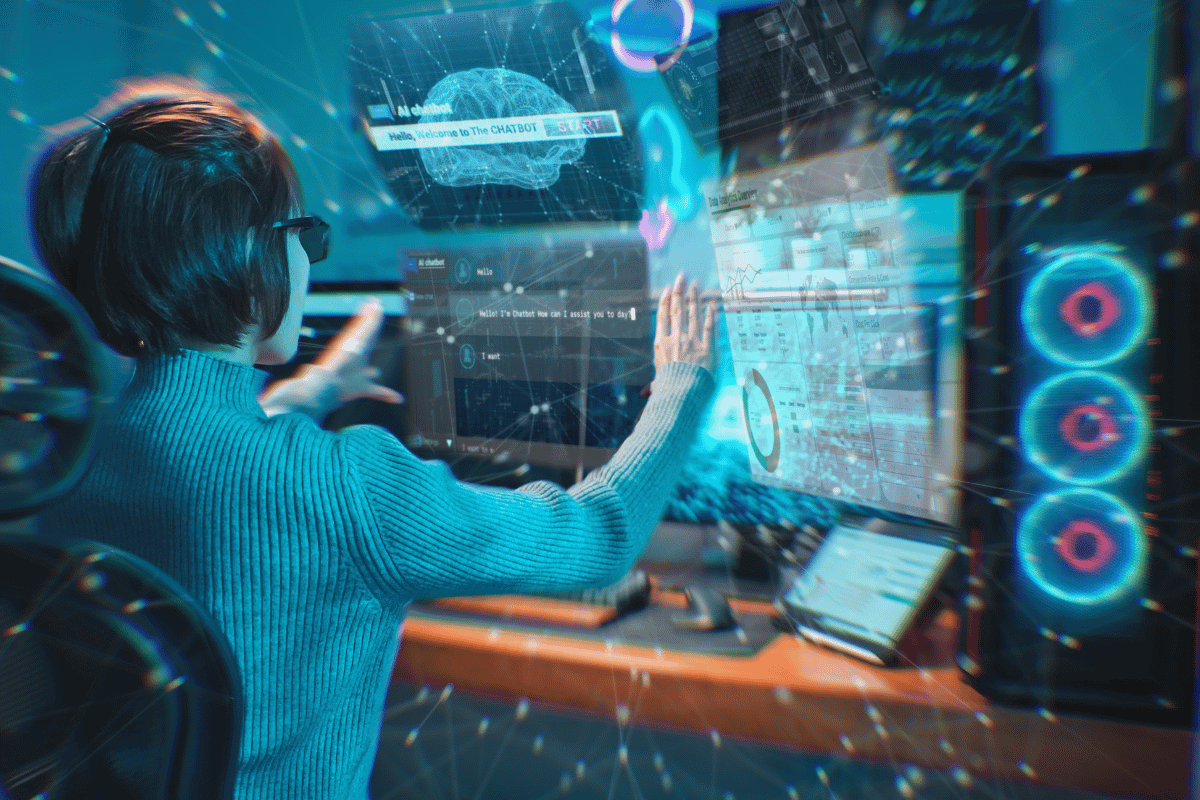The Future Of Work: How AI Will Transform Job Market
Are you ready for the future of work? Get ready to witness a transformative era as artificial intelligence (AI) takes center stage in the job market. AI has the potential to revolutionize industries, redefine job roles, and create new opportunities like never before.
In this article, we will explore how AI is set to transform the job market and what it means for you.
As AI continues to advance at an unprecedented pace, it is inevitably leading to some job displacement. However, this doesn’t mean that humans will become obsolete. Instead, AI will reshape job roles and responsibilities, allowing humans to focus on tasks that require critical thinking, creativity, and emotional intelligence. With machines handling repetitive and mundane tasks, you will have more time to engage in meaningful work that leverages your unique human skills.
In addition to redefining job roles, collaboration between humans and AI will become increasingly important. As AI becomes more integrated into our workplaces, your ability to effectively work alongside intelligent machines will be crucial for success. Embracing teamwork with AI will not only enhance productivity but also foster innovation as both humans and machines bring their respective strengths to the table.
To thrive in this evolving landscape of work driven by AI, lifelong learning and continuous skills development are essential. The rapid advancements in technology mean that skills can quickly become outdated. Therefore, staying ahead requires a commitment to ongoing learning so you can adapt and acquire new competencies as needed.
While welcoming these exciting changes brought by AI’s transformation of the job market, ethical considerations must also play a significant role. Issues such as privacy concerns and bias within algorithms need careful attention from both companies implementing AI systems and regulators developing policies around them.
The future of work holds immense possibilities with the integration of artificial intelligence into various industries. By embracing these changes proactively through continuous learning and collaboration with intelligent machines while addressing ethical concerns responsibly, you can position yourself for success in a world where human skills meet technological innovation. Get ready to embrace the future with open arms as AI revolutionizes the job market, opening up new horizons for you to explore and thrive in.
Key Takeaways
- AI has the potential to revolutionize industries and create new opportunities in the job market.
- Collaboration between humans and AI will be crucial for success in the future job market.
- Lifelong learning and continuous skills development are essential to thrive in the evolving landscape of work driven by AI.
- Ethical considerations such as privacy concerns and bias within algorithms need attention.
The Impact of AI on Job Displacement
Are you worried that AI will snatch your job away like the Big Bad Wolf in disguise? Well, fear not! While it’s true that AI has the potential to automate certain tasks and displace workers, it also brings about new opportunities for job creation.
As AI technology advances, it becomes more capable of handling repetitive and mundane tasks, allowing humans to focus on higher-level work that requires creativity and critical thinking.
The impact of AI on job displacement should be viewed through a broader lens. Yes, some jobs may be replaced by automation, but this doesn’t mean a net loss of employment. In fact, studies have shown that the implementation of AI often leads to overall job growth.
As companies adopt AI technologies, they’re able to streamline processes and increase productivity. This increased efficiency can result in economic growth and create new roles that were previously unimaginable.
Furthermore, while certain industries may experience significant changes due to AI adoption, these transformations can lead to exciting new career opportunities. For example, as automated driving technology becomes more prevalent, traditional driving jobs may decline. However, this shift opens up possibilities for individuals skilled in areas such as software development or data analysis related to autonomous vehicles.
The key is adaptability – being open to reskilling or upskilling oneself in order to embrace the changing demands of the workforce.
Although concerns about job displacement due to AI are valid, it’s important to recognize that this technological advancement also presents numerous opportunities for job creation and economic growth. Rather than fearing the Big Bad Wolf of automation lurking around every corner, we should envision a future where humans work alongside intelligent machines to achieve greater productivity and innovation.
By staying informed and adaptable in our skills and knowledge base, we can navigate this evolving landscape with confidence and optimism.
The Transformation of Job Roles and Responsibilities
Imagine how your job will change as technology takes on new responsibilities and shifts the dynamics of your role. The transformation of skills and the evolution of the job market are inevitable in this era of AI advancement.
As artificial intelligence becomes more sophisticated, it will be capable of handling repetitive tasks, data analysis, and even decision-making processes that were once exclusively done by humans. This shift will require you to adapt and acquire new skills to remain relevant in your field.
In this rapidly changing landscape, the transformation of job roles and responsibilities is an exciting opportunity for growth and innovation. While some jobs may become obsolete due to automation, new opportunities will arise that require a different set of skills.
For example, instead of spending hours on manual data entry or analysis, you could focus on interpreting complex insights derived from AI algorithms. This allows you to provide strategic recommendations based on patterns and trends that were previously unseen.
The key to thriving in this evolving job market is embracing lifelong learning and being open to acquiring new skills. As AI takes over routine tasks, there will be a higher demand for creativity, critical thinking, problem-solving abilities, emotional intelligence, and collaboration skills – areas where humans excel.
By continuously upskilling yourself with these essential qualities alongside technological advancements, you can position yourself for success in a future where human-AI collaboration becomes the norm.
The transformation of job roles and responsibilities brought about by AI presents both challenges and opportunities. Rather than fearing displacement or stagnation, envision how technology can enhance your role by automating mundane tasks while allowing you to focus on higher-order thinking activities.
Embrace the idea that continuous learning is essential for adapting to this ever-evolving landscape. By staying proactive in developing new skill sets alongside emerging technologies, you can thrive in a future where AI revolutionizes the way we work.
The Importance of Human Skills and Collaboration
The evolving landscape of technology and automation necessitates a focus on developing essential human skills, such as creativity and problem-solving, with collaboration becoming increasingly crucial – in fact, studies show that 85% of employers believe that these skills are critical for success in the workplace.
As artificial intelligence continues to advance and take over repetitive tasks, humans must embrace their unique abilities to adapt and thrive in the changing job market. Teamwork and collaboration have become paramount as complex problems require diverse perspectives and collective effort to solve efficiently.
To succeed in this new era of work, individuals must possess a set of soft skills that complement technological advancements. Interpersonal skills play a vital role in fostering effective teamwork and collaboration within organizations. The ability to communicate clearly, actively listen, and empathize with others enables teams to build strong relationships and work towards common goals. Emotional intelligence is another key aspect that allows individuals to understand their own emotions as well as those of others, facilitating better teamwork by promoting empathy, cooperation, and conflict resolution.
In addition to enhancing productivity within teams, focusing on human skills also has long-term benefits for individuals themselves. As machines handle routine tasks more efficiently than ever before, the demand for uniquely human qualities such as creativity and problem-solving will only increase. These skills cannot be easily replicated by AI systems but can greatly contribute to innovation and value creation within organizations. By honing their creative thinking abilities through collaboration with colleagues from diverse backgrounds, individuals can position themselves at the forefront of technological advancements while bringing an irreplaceable human touch to their work.
By recognizing the importance of human skills in an AI-driven future workforce, companies can prioritize hiring candidates who demonstrate strong interpersonal capabilities alongside technical expertise. Moreover, investing in training programs that foster teamwork and collaboration can help employees adapt quickly to changing roles within organizations. Embracing this shift towards valuing soft skills will not only enable businesses to navigate digital transformation effectively but also create a workplace culture where employees feel valued and supported in their professional growth.
In this future of work, the ability to collaborate effectively with both humans and machines will be a defining factor for success, and those who possess strong human skills will have a competitive advantage in the job market.
The Need for Lifelong Learning and Skills Development
To stay competitive in today’s rapidly changing landscape, you need to continuously develop your skills and embrace lifelong learning. With the rise of AI and automation, the job market is evolving at an unprecedented pace. Continuous upskilling has become crucial to adapt to these changes and ensure career longevity.
It is no longer enough to rely solely on the knowledge and skills gained during formal education; you must actively seek opportunities for growth and improvement. Adaptive learning plays a vital role in this process. As technologies advance, new roles emerge while others become obsolete. To thrive in this dynamic environment, you must be willing to learn new things and acquire new skills throughout your career.
Embracing adaptive learning means being open-minded, curious, and proactive about staying ahead of the curve. By continuously updating your skill set, you can position yourself as a valuable asset within any industry.
Continuous upskilling not only makes you more employable but also enhances your ability to contribute meaningfully in the workplace. As AI takes over repetitive tasks, human skills such as critical thinking, problem-solving, creativity, and emotional intelligence are becoming increasingly important. Lifelong learning enables you to develop these essential human skills that machines cannot replicate easily.
By investing time and effort into self-improvement through continuous upskilling, you can future-proof your career and position yourself for success in an AI-driven job market.
With AI transforming the job market at an exponential rate, continuous upskilling and embracing lifelong learning have become imperative for professional growth. The ability to adapt and acquire new skills will not only make you more competitive but also enable you to thrive in a rapidly evolving workplace environment.
So seize every opportunity for adaptive learning and never stop investing in yourself – it’s the key to shaping a successful future amidst technological advancements!
Ethical Considerations and the Role of Regulation
Are we prepared to address the ethical implications and implement necessary regulations in the face of rapid technological advancements? As AI continues to transform the job market, it is crucial that we consider the ethical considerations that arise. The use of AI raises concerns about privacy, bias, and accountability. We must develop a regulatory framework that safeguards against potential misuse and ensures fair and responsible AI practices.
In order to navigate this rapidly changing landscape, it is essential to establish an ethical framework for AI implementation. This framework should address issues such as data privacy and security, transparency in decision-making processes, and accountability for algorithmic biases. By proactively addressing these concerns, we can ensure that AI technologies are used ethically and responsibly.
Furthermore, a robust regulatory framework is necessary to govern the use of AI in the workplace. Regulations should outline guidelines for responsible data collection and usage, as well as mechanisms for auditing algorithms to detect potential biases or discriminatory practices. Additionally, regulations should provide avenues for individuals to seek recourse if they believe they have been unfairly treated by an AI system. By implementing strong regulations, we can create a level playing field where both workers and employers can benefit from AI technologies while minimizing potential risks.
Table:
| Ethical Implications | Regulatory Framework |
|---|---|
| Data Privacy | Guidelines on responsible data collection |
| Algorithmic Bias | Mechanisms for auditing algorithms |
| Accountability | Avenues for seeking recourse |
As we embrace the future of work with advancements in AI technologies, it is imperative that we prioritize ethical considerations and establish a robust regulatory framework. By doing so, we can ensure that humans remain at the center of decision-making processes while leveraging technology to enhance productivity and efficiency. Let us seize this opportunity to shape a future where innovation coexists harmoniously with moral responsibility.
Conclusion
In conclusion, the future of work is a landscape that will be shaped by the transformative power of AI. As technology continues to advance at an unprecedented rate, job displacement may become a reality for many individuals. However, it’s important to note that this doesn’t mean the end of human involvement in the workforce.
Instead, AI will serve as a catalyst for the transformation of job roles and responsibilities. While certain tasks may be automated, there will always be a need for human skills such as critical thinking, creativity, and emotional intelligence. In fact, these skills will become increasingly valuable as they can’t be replicated by machines.
As we navigate this evolving job market, collaboration between humans and AI will play a crucial role. The ability to work alongside intelligent machines and leverage their capabilities will enable us to achieve new levels of productivity and innovation. This partnership has the potential to unlock untapped opportunities and drive economic growth.
However, it’s essential that we recognize the importance of lifelong learning and skills development in order to adapt to this changing landscape effectively. With AI constantly evolving, individuals must continuously update their skill sets through upskilling and reskilling programs.
Furthermore, ethical considerations surrounding AI must be addressed. Regulations should be put in place to ensure transparency in decision-making algorithms and prevent biases or discrimination from seeping into our digital systems.
Overall, while there are challenges ahead with regards to job displacement caused by AI advancements, there’s also great potential for a future where humans can thrive alongside intelligent machines. By embracing collaboration, lifelong learning, and ethical practices, we can navigate this transformative era with confidence and create a future that benefits both individuals and society as a whole.






